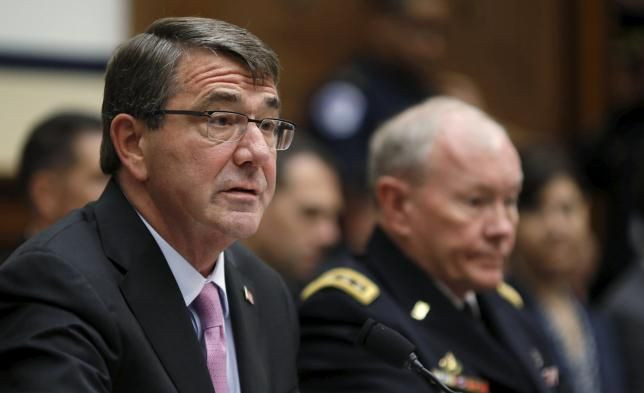Defense Secretary To Push US Allies To Ditch 'Cold War Playbook'

U.S. Defense Secretary Ash Carter will urge NATO allies to "dispose of the Cold War playbook" during a trip to Europe this week, as the alliance adapts to a new kind of threat from Russia in the east and Islamic State to the south, U.S. officials said.
Carter heads first to Berlin, where he is expected to call for a more muscular global security role from Germany, Europe's largest economy. Germany remains hesitant to deploy troops abroad, seven decades after the end of World War Two.
"He will encourage Germany, under the firm leadership of the minister of defense, to increase their security role in the world, commensurate with their political and economic weight," a senior U.S. defense official said, speaking on condition of anonymity.
Relations between Moscow and the West have plunged to a post-Cold War low since Russia annexed Ukraine's Crimea region. NATO says Russian is still actively providing military support for separatists in eastern Ukraine, despite Moscow's denials.
U.S. officials say Ukraine has illustrated the importance of being able to counter "hybrid warfare," the blend of unidentified troops, propaganda and economic pressure that the west says Russia has used there. NATO's historic focus had been the conventional threats of the Cold War, which ended in 1991.
"Carter ... will really push the alliance to think about new threats, new techniques, urge them to kind of dispose of the Cold War playbook and think about new ways to counter new threats," the official said.
In visits in Germany and then in Estonia, Carter will get a first-hand look at NATO's new rapid response forces and climb aboard a U.S. warship fresh from Baltic Sea drills, aiming to reassure allies unnerved by Russia's intervention in Ukraine.
Carter will likely offer details on plans to pre-position heavy military equipment in Europe, the official said.
All of the moves been decried by Moscow, which has threatened to beef up its own forces and to add more than 40 intercontinental ballistic missiles to its nuclear arsenal this year.
Apart from Russia's annexation of Crimea, NATO officials say the rise of Islamic State and other militants in North Africa and the Middle East has also dramatically changed NATO's security environment.
NATO defense chiefs meeting on Wednesday and Thursday in Brussels are expected to discuss plans to create an alliance role in Iraq aimed at strengthening Iraq's institutions. A plan could be approved in July, the U.S. official said.
(Reporting by Phil Stewart; additional reporting by Adrian Croft in Brussels; Editing by David Gregorio)
© Copyright Thomson Reuters {{Year}}. All rights reserved.





















